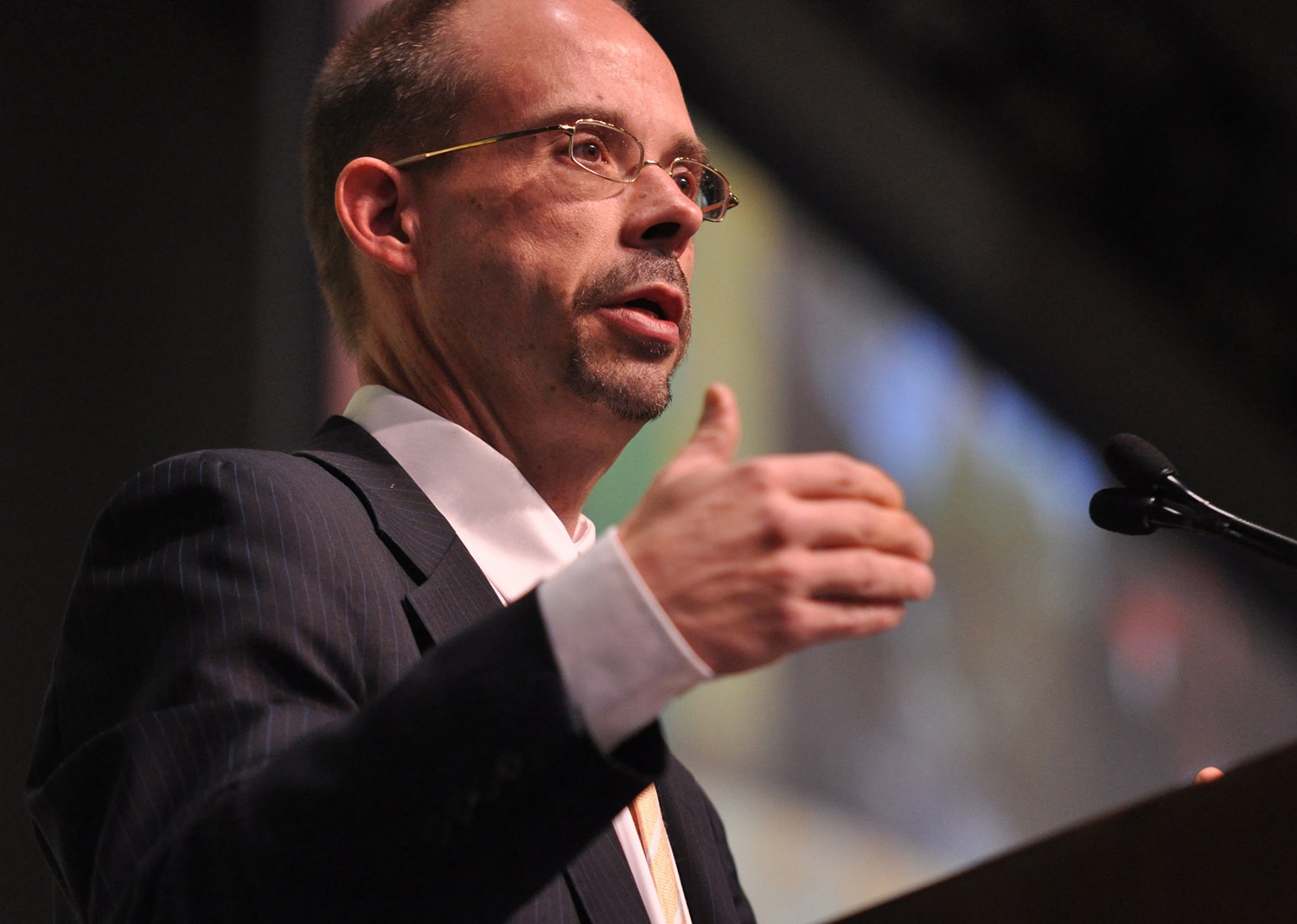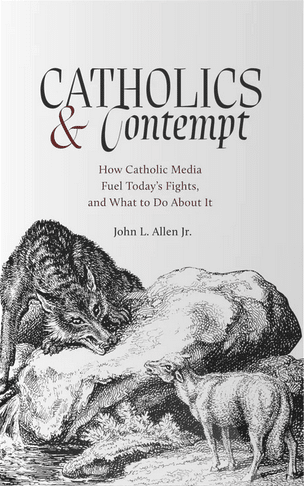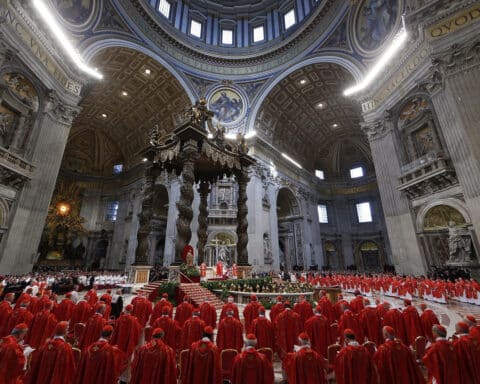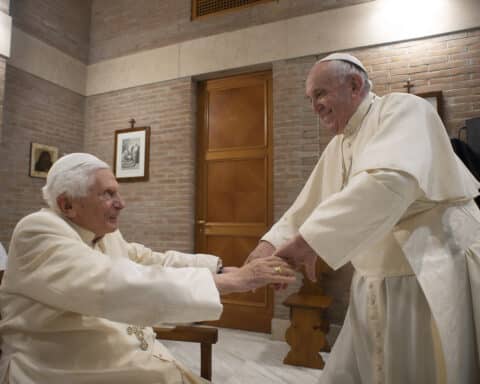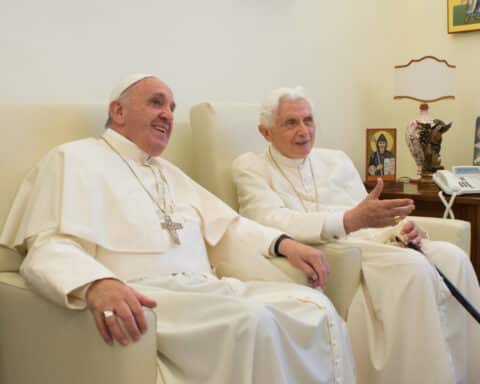(OSV News) John L. Allen Jr. is the editor of Crux, an independent online news site initially founded as a project of The Boston Globe in 2014, that specializes in coverage of the Vatican and the Catholic Church. The London Tablet has called him “the most authoritative writer on Vatican affairs in the English language,” and his work has been recognized across ideological divides. Allen, who has written close to a dozen books on the Vatican and Catholic affairs, talks with Charlie Camosy about his book “Catholics and Contempt: How Catholic Media Fuel Today’s Fights, and What to Do About It,” published in June by Word on Fire. Allen is a communications and media fellow of the Word on Fire Institute.
Charlie Camosy: You’ve written a lot of books. And your day job keeps you really busy. Why did you decide to write “Catholics and Contempt”? It is not a short, effortless jaunt through a topic, but rather a detailed attempt to engage the meat of the issues you raise. It must have taken some time. Why take that time? Why do we need this book right now?
John L. Allen Jr.: In various guises, the culture of contempt is a force anyone working in today’s media environment has to face. Over the years, I’ve tried in various small ways to engage the issue … sometimes, ironically enough, accidentally making it worse — for instance, when I once coined the phrase “Catholic Taliban” to try to describe a certain mindset, and made a lot of people angry who thought I was talking about them. At a certain point, I decided I needed to have the courage of my convictions and make a serious effort to try to name the problem and to think through what ameliorating it might look like. I also thought that the Word of Fire Institute was the perfect platform for such a book, because if there’s any public figure in American Catholicism today who exemplifies a non-contemptuous way of engaging important issues, it’s probably Bishop Robert Barron … who, by the way, sometimes attracts some awfully contemptuous reactions, on both the right and the left, for his trouble.
Camosy: What are some best practices to avoid the kind of contempt that you call out in this book?
Allen: I suppose it’s the “better to light a candle than curse the darkness” idea: Just go out there and try to report and analyze the news in non-contemptuous ways, rather than spending a lot of time complaining about what others are doing. In many ways, this doesn’t require us to do anything new. On the contrary, it’s really a kind of journalistic “ressourcement” … getting back to the original idea of journalism as telling the story in an accurate, comprehensive and fair way, without taking sides. The fact that it’s not practiced much these days doesn’t mean doing so requires reinventing the wheel; it just requires a conscious decision to swim against the tide.
If you want one practical rule of thumb, try this: Never describe anyone in print or on the air in terms they themselves wouldn’t recognize. Don’t call someone a “culture warrior,” for example, but a “defender of traditional moral values.” That doesn’t cost you anything, it captures the same idea, and it generates light rather than heat. Similarly, don’t call someone a “relativist” or a “modernist,” but say they “advocate evolution in doctrine.” Same concept, same result.
Camosy: Can you pick one of the chapters that you used as a “case study” and give us a taste of how those best practices were (or, indeed, were not) used?
Allen: I think the black legend around Pope Benedict XVI is a great example, because it’s such an obvious one. To this day, a basic Google search will turn up countless articles and broadcasts depicting him as the poster boy for the clerical sexual abuse crisis in the Catholic Church, when any serious effort to report the reality would confirm that the reform effort actually began on his watch at the Congregation for the Doctrine of the Faith, when he fought an often lonely battle to take the crisis seriously. That doesn’t mean he was perfect, and there was plenty of unfinished business when he stepped down, but the idea that he was somehow in denial or part of the cover-up just doesn’t stand up to any serious examination. In that sense, he was a perfect illustration of how narrative trumps reality in the media world almost every time: The narrative told us he was a bad guy, and so the story of what he actually did never really saw the light of day.
Camosy: OK, let’s put some of this to use for stuff going on in the present moment. We are in the last few moments of the run up to the synod. How can your insights be best put into use in thinking about, talking about and covering the 2023 assembly of the Synod on Synodality?
Allen: I’ve actually made a modest proposal in this regard. To wit, I’ve suggested a synodal version of the famous Godwin’s law, which is that the first person to make a comparison to the Nazis in an online discussion loses the argument. My analogue idea is that in discussing the synod, the first person to use either the term “heresy” or “rigidity” in describing someone else’s position ought to be disqualified from further commentary. Obviously, those are deliberately chosen bits of vocabulary, as “heresy” is the most common pejorative tossed around by the Catholic right against the left, while “rigidity” is a favorite shaming term by the left for the right. If we could get through at least the first week or so without that sort of labeling, it would be a mammoth achievement. I concede, however, that I’m not terribly optimistic.
Camosy: Finally, the main objection that I’m sure most everyone has is, “How can one be profitable and compete with others who make so much money by rejecting your best practices?” How do you respond to this objection? Can an outlet stay profitable and follow your lead here?
Allen: Well, look at it like this: Investors and venture capitalists are forever looking for holes in the market, meaning needs that at least some people experience (even if they may not be consciously aware of it right now) and which aren’t presently being served. I’d argue that at the moment, non-biased, non-contemptuous, non-ideologically skewed journalism is just such an under-served market. Let me put it another way: St. John XXIII once famously said that he had to be pope both for those with their foot on the gas, and those with their foot on the brake. Right now, the media market is crowded with outlets hitting the gas, so maybe there’s room for somebody to put on the brakes once in a while. In our own very small and deeply imperfect way, the fact that Crux is still alive and kicking after almost a decade is, I suppose, a minor proof of concept.

